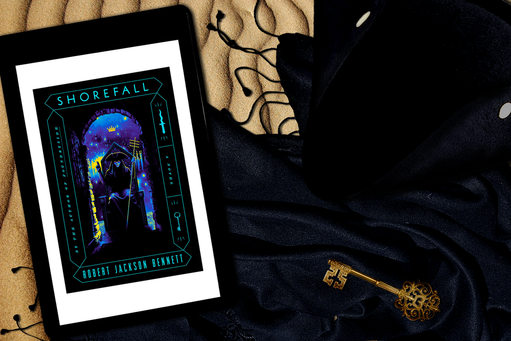
"If there be a person alive with more power than myself, then over time circumstances shall eventually degrade until, inevitably, I am their slave. And if our situations were to be reversed, then they shall inevitably become mine.
-- Crasedes Magnus" 'Shorefall (The Founders Trilogy #2)' by Robert Jackson Bennett is a deep-dive fantasy novel about a sort of hobbled together group of rebels, bound by the struggles they've shared and a communal desire to free others like themselves. Though I didn't read the first book in the series, I had no trouble picking this one up and settling right into what was going on. In a world where people rely heavily on the art of scriving-- the act of imbuing everyday objects with sentience and permissions they wouldn't normally have by nature's rules, there comes a battle between two godlike figures. Crasedes Magnus, the first of the great hierophants and Valeria, the construct who defeated him in their last conflict.. were both left too damaged to affect the changes they intended without help. Our protagonist is a spitfire named Sancia Grado, who just so happens to be able to physically see the logic of the scrivings sunken into the objects around her and interact with them, convincing them to do things they aren't meant to. She's rough around the edges, she's amusingly sarcastic at times, but she's also capable of great love and loyalty. It just doesn't usually look like what we might expect from a heroine. "I remember the plan," said Sancia. "I just also remember there's a lot of spots in the plan that say, 'Sancia improvises a bunch of s***.' Which is not, you know, comforting." Accompanied by her girlfriend Berenice (together, the two referred to as The Muses), the old scriver Orso (who left the Founding Houses and struck out on his own in an attempt to bring technology more equally to the people), and Gregor (the son of one of the Founding Houses.. and a broken thing in his own right), Sancia intends to put a stop to Crasedes as well. Their relationships are all rather beautifully complex. Each carrying their own baggage as they try to alleviate those same agonies in those around them. As a team, they're a well-oiled machine. They complement each other's skills and temperments, and really.. this is what I find is the core thread through the story. It's a tale about taking on the greatest of odds together. While of course, that is no guarantee of success, Bennett certainly shows the reader how much stronger they are because of their common goals and willingness to put each other first. "We are all keepers of a secret flame, lighting the way forward." "Not a flame, I think," he said. "A spark. We intend to start an inferno." "Yet fires do not care about who they burn." As great as Sancia is, it's Gregor I find myself drawn to. He's the tragic beauty. It doesn't matter that he's a deadly warrior, that he's covered in scars, and emotionally cold and distant much of the time. There's still something elegant about him, he just feels so lost to me all the time. I have some minor complaints, of course I do. Understandably, Bennett's ideas are complex. The very theory of scriving itself is fascinating and in their world it's everywhere. It's used for defenses, both personal and geographical, but it's also used for everyday work. Irrigation. Light. Construction. Every part of their world has been touched by it, maybe not improved.. but progression is not always improvement, is it? Despite the complexity of the concepts, in my opinion he goes a bit overboard with the information dumps about how everything works. It's constant. Explain a few things to me so I get how it works in theory and then focus on the story itself. Whatever. The result was it made the book a bit more of a trudge than it needed to be, but it also didn't seem to weaken his work on the characters, plot, or relationships at all. So, it's just a personal preference. I would have liked less of that. Also, I would have liked less easy answers. With Sancia able to look at any scrived rig, see exactly how it works and how to manipulate it, that's borderline convenient already. But add in the all knowing beings and the ways they find to share information as they move toward their goals, it's just a bit too much. I really dislike everything being able to be explained in a flash of knowledge at every turn. "What a thing, to wish to be unmade," he thought. "To yearn to open up one's skull and allow all the bindings there to come unspooling out like lengths of wire..." Ultimately, none of my small protests matter. The story is gripping. I was invested from the start and remained so throughout. Most of the book has no real time for emotion. That isn't to say the characters don't experience them, they're just pressed for time, pressed for action.. they cannot just still and let themselves crumble. There are moments however, that I found incredibly moving. While the tension ramped up and time seemed fleeting, every decision became that much more crucial. Reveals, long foreshadowed and slow to come to fruition, made harsh impacts.. both on the characters and the reader. I was deeply unhappy with how certain events unfolded.. and I'm absolutely certain that is exactly why they were the right choices. The author left me feeling as bereft and broken as those within his story seemed to be.. and I can't wait for him to do it again. Come on.. book 3..
0 Comments
Leave a Reply. |
Archives
November 2023
|




 RSS Feed
RSS Feed